Wool combs have been found in archaeological sites dating back to the 10th century. They are still used today to separate and straighten fibers in preparation for spinning. I wrote a little about carding wool with a drum or hand cards in an article on preparing wool for spinning. Some long fibers cannot be processed on a drum carder. It catches on the other drum and tangles.
There are many types of combs. There are mini combs, double row combs, fine combs, English wool combs and double and single row Viking combs. Some are large with one comb clamped to a table. Others are smaller and held in the hands.
My combs are a set of Valkyrie Viking Combs. I didn’t really have any reason to select these. They were given to me. I had Angora goats at the time and these combs are great for the long Angora fibers that are too long for a drum or hand carder.
I didn’t know really how to use them when I first brought them home and didn’t know anyone else who used them. I’ve learned a few things about these combs over time.

How to Use Viking Wool Combs
by Ragtimelil
Combs have long steel teeth with very, very sharp points. They are designed to comb wool so that all the fibers are laying parallel to each other and are ready to spin.
The section on Using a Diz was updated 10/18/12.
The Combs
The English wool combs are usually large and one comb is attached to a table. The other comb is swung back and forth to separate and fluff up the wool.
The viking combs are held one in each hand. There is a jig for holding one if wanted but I've never used it. It might come in handy when using the diz as I've described below.
The Valkyrie mini combs are not that small. They are a good all purpose comb for fine and medium fibers. They come with single or double rows of teeth.
Extra fine combs are for combing fine, short fibers. The Valkyrie combs have as many as 43 closely spaced tines mounted in the handle.
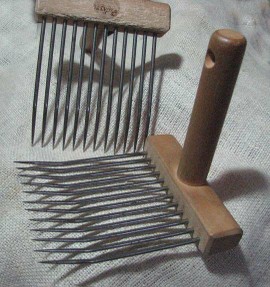
Viking combs are the traditional combs for long and medium sheep, llama and Angora goat fiber. My combs have 4.5 inch steel tines set in a 5 inch handle. Mine have a single row of teeth but I’ve seen them with two rows.
Combing
Your dominant hand will hold the working comb. Your other hand will hold the comb with the fleece loaded on it.
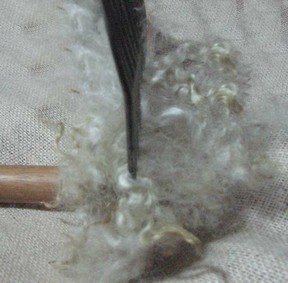
To load the comb, drag the clean locks so the clipped end will catch on the teeth. Load it so that the tines are about ¼ full. Some people will spray lightly with water or a water and oil mix. I don’t. I live in a humid climate so I think that’s why I don’t usually have a problem with static. If you do use a spray, don’t overdo it or you’ll end up with a soggy wet fleece. In addition, unless the teeth are stainless steel, it could rust and stain the fleece.
Lift up the locks about one inch from the bottom of the teeth. This will prevent hitting the handle and make tit easier to separate the fibers.
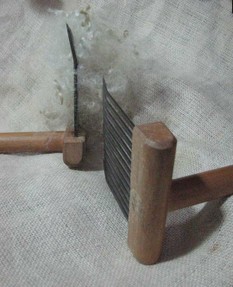
Turn the combs so that they are at a 90 degree angle to each other. You will be combing from the side of the loaded comb, not from top to bottom. Start working at the outer edge of the fleece and work your way in. You can turn and work from the other side as well. When the wool has all been transferred to the working comb, switch combs and comb again.
A Sliver
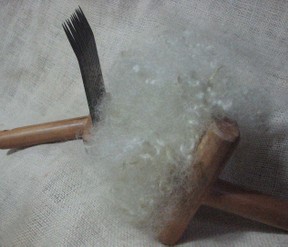
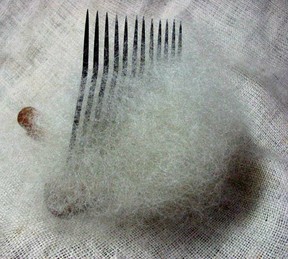
Continue until it is all as smooth as you want it. I save the waste, the short pieces that stay on the comb, for running through a drum carder or hand cards or for blending or felting.
Now grab the end of the fleece and gently pull it. You can work it gently from side to side and hand over hand. You don’t want to try to yank it off; you want a long, soft sliver. If you have combs with two or three rows of teeth, you can comb it again, but with my single row, the wool will just drift out so that is about it for me. You can spin right from this wonderful hank of wool.
Another way to pull your sliver off the comb is through a diz.
Using a Diz
A diz is a small, round or oval disc with a hole in the center that the combed wool is pulled through. This shapes the wool into long ropes of slivers. The size of the hole determines the size of the sliver.
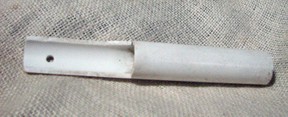
My diz is homemade and a little odd shaped. I tried making a diz on a stand after reading an article about it. I didn't really like the stand, but I never changed the shape of the PVC diz part. It just has a handle on it.
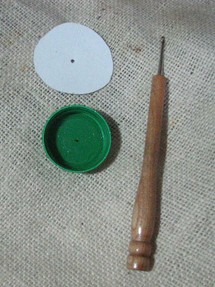
You can make a diz out of a circle of cardboard or plastic with a small hole punched in the middle. Plastic bottle caps make a good diz as do large buttons or beads.
I use a very small rug hook to pull the wool through.
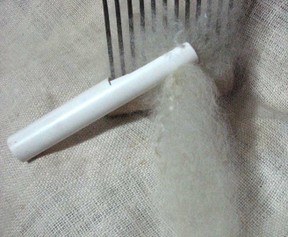
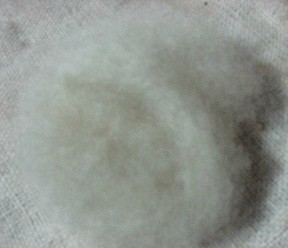
You will need your hook to grab the end of the wool and draw it through the hole in the diz. The trick is to pull the diz and the wool toward you, then push the diz forward and repeat. You end up with a tidy sliver than can be wrapped in a ball for storage until you’re ready to spin.
Combing Demo
You'll see a more traditional style diz on this video
You might also like
How to Prepare Wool for SpinningIf you have your own sheep, or were given a fleece, now you need to know how ...
How to Spin Yarn Without a Spinning WheelAlways thought you'd like to learn how to spin, but didn't want to spend the ...
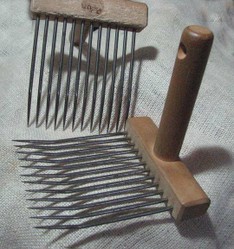



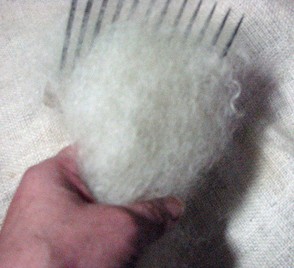
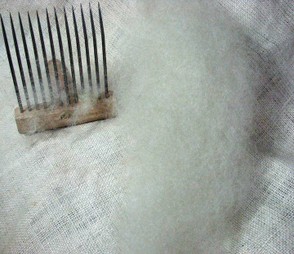

 How I Found My Free Family History Programon 09/05/2013
How I Found My Free Family History Programon 09/05/2013
 Finding a Graveon 09/01/2013
Finding a Graveon 09/01/2013
 Do Border Collies Make Good Pets?on 08/11/2013
Do Border Collies Make Good Pets?on 08/11/2013
 Hubert Patey - an Indentured Servanton 08/02/2013
Hubert Patey - an Indentured Servanton 08/02/2013

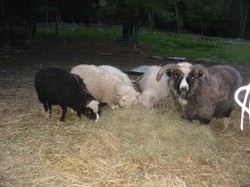
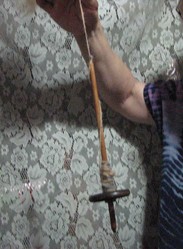
Combing Comments
Thanks. I took a lot of pictures for this!
Thank you, thank you. I apologize for using a white background. I wasn't thinking....
I like the way you've used your photos in this article. They make the instructions easy to follow.
Happy 100!